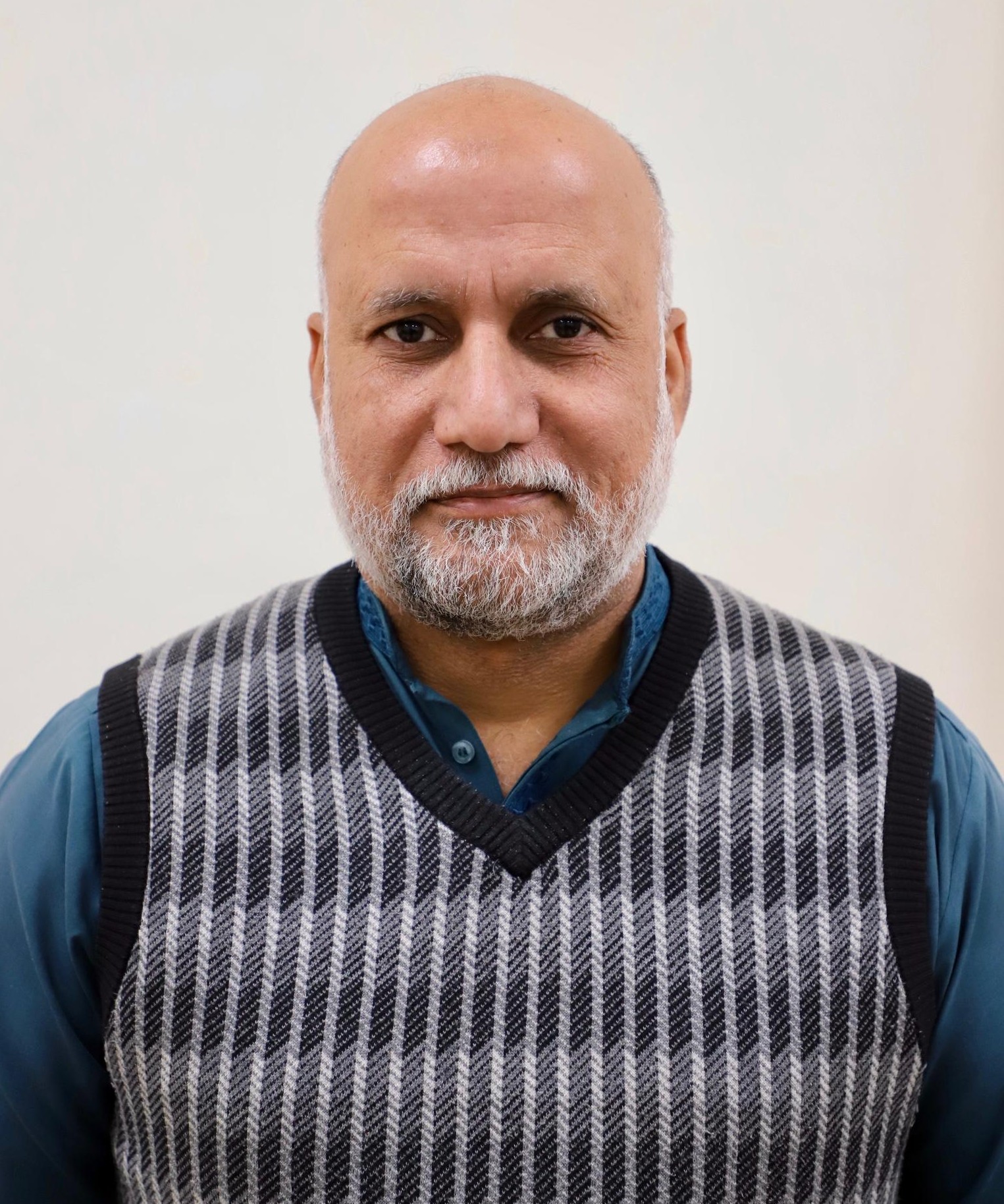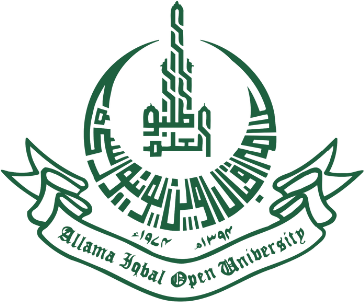
Education
|
Mar 01, 2010 – Feb 23, 2015 |
Ph.D. Computer Science, Yonsei University, Seoul, South Korea. Dissertation title: Adaptive Human Activity Recognition System Using Smart- phone Accelerometer. |
|
Mar 2005 – Aug 2009 |
M.S. Computer Science, Allama Iqbal Open University, Islamabad, Pakistan. Thesis title: Semantic Search and Retrieval System for Learning Objects through Open Source. |
|
Sep 1999 – Mar 2002 |
M.Sc. Computer Science, Quaid-i-Azam University, Islamabad, Pakistan. Thesis title: An SVG Editor. |
Experience
| Aug 24, 2016 – · · · · | Assistant Professor, Department of Computer Science, Allama Iqbal Open University, Islamabad, Pakistan. |
| May 17, 2004 – Aug 23, 2016 | Lecturer, Department of Computer Science, Allama Iqbal Open University, Islamabad, Pakistan. |
| Mar 01, 2004 – May 14, 2004 | Lecturer. Department of Computer Science, COMSATS Institute of Information Technology, Attock, Pakistan. |
Miscellaneous Experience
Awards and Achievements
| Aug 2022 | Certificate of Appreciation, Awarded by the Department of Computer Sci- ence, AIOU, Islamabad. The one-day workshop on Introduction to Java Appli- cation and Applet. |
| 2010 – 2015 | Merit Scholarship for Higher Education, Awarded by Higher Education Commission, Islamabad, Pakistan to pursue PhD studies. |
| Dec 2007 | Certificate of Appreciation, Awarded by the Government of Pakistan, Cab- inet Division, Pakistan Telecommunication Authority (PTA), Islamabad. The development of bilingual (English & Urdu) Multimedia Instructional Material for the Rabta Ghar Scheme of Pakistan Telecommunication Authority (PTA). |
Certification
| Jun 13 – Sep 9, 2006 | Teaching and Learning in Higher Education. "7th Faculty Development Program" organized by and held at the Learning Innovation Division, Higher Education Commission, Islamabad, Pakistan. |
| Oct 12 – 24, 2009 | Teaching and Learning in Higher Education. "Advance Specified Course for MT-FPDP Alumni" organized by and held at the Learning Innovation Di- vision, Higher Education Commission, Islamabad, Pakistan. |
| Aug 29 – Sep 02, 2022 | One-week international training workshop on Natural Language Process- ing (NLP) organized by Center for Languages and Translation Studies & ORIC, AIOU, Islamabad, in Collaboration with Kohsar University, Murree. |
| Aug 21 – Sep 29, 2023 | LISAN-UL-QURAN. Instructor: "Amir Sohail Sb" organized by and held at Baseerah Institute (Islamic Education with Modern Approach), Chaklala Cam- pus, Rawalpindi, Pakistan. |
| Apr 1, 2024 | Introduction to Generative AI. An online non-credit course authorized by Google Cloud and offered through Coursera. |
Publications
Journal Articles
- T. Ismail, M. A. Awan, and D. Khaleeq, “Exploring contextual similarity in quranic ayahs: A case study of surah al-baqarah and aal-e-imran in urdu translations,” International Journal of Information Science and Technology (IJIST), vol. 07, no. 01, pp. 69–82, Jan. 2025.
url: https://journal.50sea.com/index.php/IJIST/1article/view/1176.
- S. Hamid, M. A. Awan, and M. Saeed, “Assessment of ml classifiers in complex human activity recognition using wearable sensors data,” International Journal of Information Science and Technology (IJIST), vol. Special Issue, pp. 104–117, Oct. 2024.
url: https://journal.50sea.com/index.php/IJIST/article/view/1088.
- M. Saeed, A. Awan, and S. Hameed, “Complex human activities recognition using smartphone sensors: A deep learning approach,” International Journal of Information Science and Technology (IJIST), vol. Special Issue, pp. 172–184, Oct. 2024.
url: https://journal.50sea.com/index.php/IJIST/article/view/1076.
- F. Aslam, F. B. Aplop, M. A. Awan, and M. W. Aslam, “Recognition of arm exercises of stroke patient through smartphone accelerometer sensor using machine learning algorithm,” Research, vol. 8, no. 2, 2023.
url: https://scholar.google.com/citations?view_op=view_citation&hl=en&user= KDIWHOEAAAAJ&citation_for_view=KDIWHOEAAAAJ:5nxA0vEk-isC.
- M. Hussain, A. Sajid, A. Ayeb, and A. Awan, “Predicting the price of used electronic devices using machine learning techniques,” International Journal of Computing and Related Technologies, vol. 4, no. 1, pp. 13–19, Jul. 2023.
url: http://ijcrt.smiu.edu.pk/ijcrt/index.php/smiu/article/view/152.
- T. Hussain, A. Khan, M. Awan, et al., “A step forward in learning during pandemic: Emergingtechnologies and innovative pedagogies,” Proceedings of ICSEST, pp. 82–90, 2022.
Url:https://www.researchgate.net/publication/367127829.
- Z. Noreen, M. Ajmal, A. Awan, et al., “Impact of authentic learning on the satisfaction, knowledge and skills of distance learners in context-aware ubiquitous learning environment,” Global Regional Review, vol. 4, no. 2, pp. 115–125, 2019.
doi: 10.31703/grr.2019(IV-II).13.
- M. A. Awan, “Adaptive har system to improve recognition accuracy,” Mehran University Research Journal of Engineering & Technology, vol. 37, no. 3, pp. 467–482, 2018.
doi: https://doi.org/10.22581/muet1982.1803.03.
- S. N. Khan, K. Mir, A. Tahir, A. Awan, Z. U. Nisa, and S. A. Gillani, “Allocation of tutors and study centers in distance learning using geospatial technologies,” ISPRS International Journal of Geo-Information, vol. 7, no. 5, p. 185, 2018.
doi: https://doi.org/10.3390/ijgi7050185.
- Z. un Nisa, K. Mir, H. Fatimah, S. M. Batool, et al., “Application of satellite remote sensing in forest change detection and its environmental impacts in district abbottabad, pakistan,” JPAA, vol. 3, no. 1, 2018.
url: https://www.researchgate.net/publication/328562702_Application_of_satellite_remote_sensing_i_forest_change_detection_and_its_environmental_impacts_in_district_Abbottabad_Pakistan.
- T. Javed, M. A. Awan, and T. Hussain, “Recognition of arm & elbow exercises using smartphone’s accelerometer,” NFC IEFR Journal of Engineering and Scientific Research, vol. 5, 2017.
url:http://nijesr.com/ojs/index.php/archive/article/view/
- A.A. Soofi and A. Awan, “Classification techniques in machine learning: Applications and issues,” Journal of Basic & Applied Sciences, vol. 13, pp. 459–465, 2017.
doi:https://doi.org/10.6000/19275129.2017.13.76.
- M. A. Awan, Z. Guangbin, H.-C. Kim, and S.-D. Kim, “Subject-independent human activity recognition using smartphone accelerometer with cloud support,” International Journal of Ad Hoc and Ubiquitous Computing, vol. 20, no. 3, pp. 172–185, 2015.
doi: https://doi.org/10.1504/IJAHUC.2015.073170.
- M. A. Awan, Z. Guangbin, C.-G. Kim, and S.-D. Kim, “Human activity recognition in wsn: A comparative study,” International Journal of Networked and Distributed Computing, vol. 2, no. 4, pp. 221–230, 2014.
doi: https://doi.org/10.2991/ijndc.2014.2.4.3.
- Z. Guangbin, M. A. Awan, and S.-D. Kim, “An extensible healthcare context engine based on smart phones,” Lecture Notes on Software Engineering, vol. 2, no. 1, p. 81, 2014.
doi: 10.7763/LNSE.2014.V2.99.
- M. Tahir, T. M. Madani, S. Ziauddin, M. A. Awan, and W. H. Rana, “Wiimote squash: Comparing dtw and wfm techniques for 3d gesture recognition.,” Int. Arab J. Inf. Technol., vol. 11, no. 4, pp. 362–369, 2014.
url: https://www.researchgate.net/publication/266396220_Wiimote_Squash_Comparing_DTW_and_WFM_Techniques_for_3D_Gesture_Recognition.
- M. A. Awan, Z. Guangbin, and S.-D. Kim, “A dynamic approach to recognize activities in wsn,” International Journal of Distributed Sensor Networks, vol. 9, no. 4, p. 385 276, 2013.
doi: https://doi.org/10.1155/2013/385276.
- M. Tahir, M. A. Awan, A. Hafeez, M. Yazdanie, and S. Ziauddin, “Interactive slide navigation: An approach for manipulating slides with augmented reality markers,” SmartCR, vol. 2, no. 2, pp. 138–148, 2012.
url: https://www.dbpia.co.kr/Journal/articleDetail?nodeId=NODE02467449.
- M. A. Awan, C. G. Kim, C.-P. Hong, J.-H. Lee, and S.-D. Kim, “A survey of augmented reality on handheld devices,” IEMEK Journal of Embedded Systems and Applications, vol. 5, no. 4, pp. 195–205, 2010.
url: https://koreascience.kr/article/JAKO201019858186772.page.
Conference Proceedings
- A.Sajid and M. A. Awan, “Monitoring, tracking and diagnosing dengue fever using smartphone, gps and machine learning,” in 2021 1Gth International Conference on Emerging Technologies (ICET), IEEE, 2021, pp. 1–6.
doi: 10.1109/ICET54505.2021.9689785.
- M. A. Awan, Z. Guangbin, Y. Xiyuan, and S.-D. Kim, “An adaptive context engine based on activity recognition using smartphone sensors,” Feb. 2014.
url: https://www.researchgate.net/publication/266396152_An_adaptive_context_engine_based_on_ activity_recognition_using_Smartphone_sensors.
- M. A. Awan, A. Sattar, C. G. Kim, C. P. Hong, and S. D. Kim, “Semantic search and retrieval system for learning objects,” in Proceedings of the International Conference on IT Convergence and Security 2011, Springer, 2012, pp. 129–143.
doi: https://doi.org/10.1007/978-94-007-2911-7_11.
- M. A. Awan, Z. Guangbin, and S.-D. Kim, “Activity recognition in wsn: A data-driven approach,” in 2012 7th International Conference on Computing and Convergence Technology (ICCCT), IEEE, 2012, pp. 15–20.
url: https://ieeexplore.ieee.org/abstract/document/6530291.
- C.-P. Hong, M. A. Awan, C.-G. Kim, and S.-D. Kim, “An efficient live stream community management scheme for the mobile,” in Proceedings of the International Conference on IT Convergence and Security 2011, Springer, 2012, pp. 281–293.
doi: https://doi.org/10.1007/978-94-007-2911-7_24.
Project, Research Interests
Research Projects Completed
Feb 2018 – Jan 2019 SDSS for open and distance learning – a case study of AIOU, National Re- search Program for Universities (NRPU-5229) – Higher Education Commission, Islamabad, Pakistan.
Research Theses Supervised/Completed
PhD Effectiveness of Indigenous Context-Aware Ubiquitous Learning Application on Distance Learn- ers (Zubia Noreen, December 20, 2019)
MS Recognition of Arm Exercises for Stroke Patients using Smartphone Accelerometer (Fahad Aslam, April 22,2019) AHEM: Hybrid Approach for Elderly Monitoring (Fatima Kayani, July 19, 2019) Smart Wearable Infant Monitoring System (SWIMS) for Seizure Disease (Naila Firdos, August 23, 2019)
Research Theses Supervised/Completed (continued)
-
-
- CARE: An Engine for the Interpretation of Eye Blink (Roohi Bano, September 26, 2019)
- Orientation Independent Approach for Human Activity Recognition Using Smartphone (Man- zoor Hussain, October 02, 2019)
- Career Counselor: An Approach to Guide Secondary Level Students in Pakistan (Surriya Bibi, September 15, 2020)
- Complex Human Activity Recognition using Smartphone Sensors: A Deep Learning Approach (Mubashar Saeed, March 24, 2021)
- Monitoring and Tracking of Dengue Fever using Smartphone Via GPS (Abdul Sajid, November 25, 2021)
- MOTHER: Monitoring of Teenagers’ Habits Embodied in Routine Activities (Nadia Mehnaz, Jan- uary 18, 2022)
- Exercise Monitoring of Senile Osteoporosis by Smartphone Sensors (Asma Rasul, January 18, 2022)
- Smartphone Surveillance System for Enhancement of Government Employees Work Productiv- ity - A Case Study of Pakistan (Muhammad Adnan, April 01, 2022)
- Elderly Monitoring using Deep Learning to Optimize the Tradeoff between Recognition Accu- racy & Response Time (Afifa Mushtaq, November 16, 2022)
- Predicting the Price of Used Electronic Devices using Machine Learning (Muhammad Hasnain, November 23, 2022)
- User Independent Human Activity Recognition using Smartphone (Shehla Habib, January 09, 2023)
- Detection of Smartphone Position on Human Body: A Position Independent Approach in HAR (Saba Shehzad, November 23, 2023)
- Ball Based Approach to Predict Cricket Outcome Using Machine Learning (Muhammad Nauman Sajid, December 22, 2023)
-
BS
-
-
- OneWindow: An Ecommerce Platform (Spring, 2023)
- FashionNova: An Online Clothing Store (Spring, 2023)
- Urdu Dictation: A Speech-to-Text Application (Spring, 2023)
- Urdu Quranic Dictionary (Spring, 2024)
- Land Ventures Rental Mobile Application (Spring, 2024)
-
Research Theses Under Supervision
PhD
- Topic yet to be finalized (Saira Hamid, 2024)
MPhil
- Enhancing Clarity in Urdu Translations of the Holy Quran through Word Sense Disambiguation (Kashif Masood Abbasi, 2024)
- Multi-Label Theme-Based Classification of Quranic Verses for Urdu Translations: A Case Study for Surah Al-Baqarah and Aal-e-Imran (Rao Muhammad Waseem Ashraf, 2024)
- Development of an NLP-Based Quranic Chatbot for Urdu-speaking Users (Muhammad Tariq, 2024)
- Machine Translation of Quranic Verses into Urdu Using the Transformer Model (Danish Khaleeq, 2024)
- Understanding Ethics and Morality from Urdu Translation of the Quran Using NLP (Yasir Aftab, 2024)
- Development of an Ontology for Quranic Concepts with Arabic-Urdu Annotation (Fouzia Nadeem, 2024)
Research Theses Under Supervision (continued)
-
-
- Analyzing the Emotional Tone in Urdu Translations of the Quran: A Comparative Study (Nimra Nawaz, 2024)
- Identification of Contextual Similarity Among Quranic Ayahs for Urdu Translations: A Case Study for Surah Al-Baqarah and Aal-e-Imran (Tehmima Ismail, 2024)
- Topic yet to be finalized (Naila Azeem, 2024)
- Topic yet to be finalized (Syeda Sadia Batool, 2024)
- Topic yet to be finalized ( Junaid Amjad, 2024)
-
BS Course Folder Management System (Fall, 2024)
Skills
Languages Reading, writing, and speaking competencies for English and Urdu.
Courses Taught Theory of Automata/Computation/PL, Compiler Construction, Machine Learning, Operating System, Programming in (C/C++, C#, Java, Python), Data Structures, DBMS, KMS, and Analysis of Algorithms.
Coding Java, kotlin, C/C++, C#, python, . . .
Web Dev Django, and WordPress.
Misc. Academic research, teaching, training.
References
Dr. Ayyaz Hussain
Professor
Department of Computer Science,
Quaid-i-Azam University, Islamabad, Pakistan.
+92 51 9064 2059
http://cs.qau.edu.pk/profiles/ayyaz.htm
Dr. Saleem Iqbal
Associate Professor
Department of Computer Science,
Allama Iqbal Open University, Islamabad, Pakistan.
+92 51 957 5350

